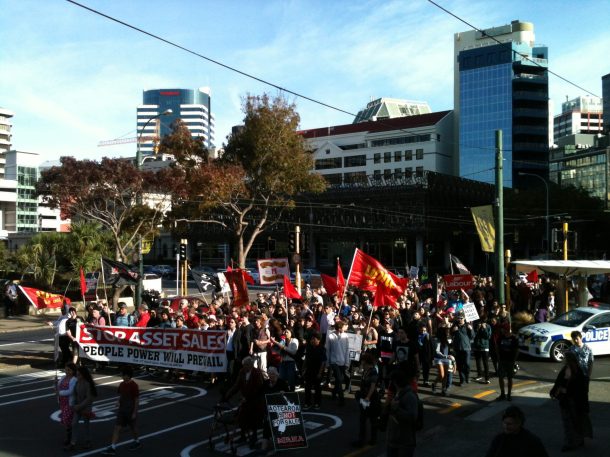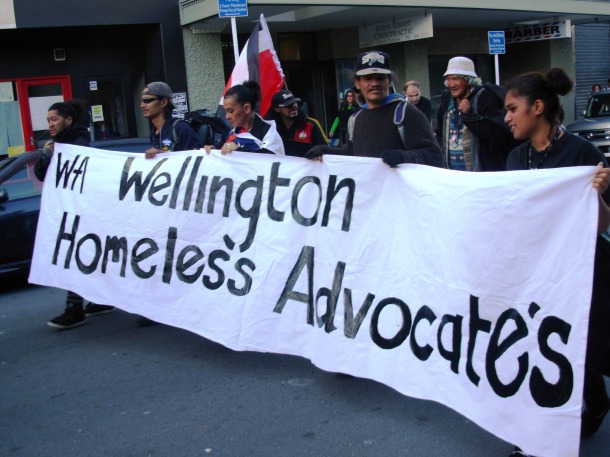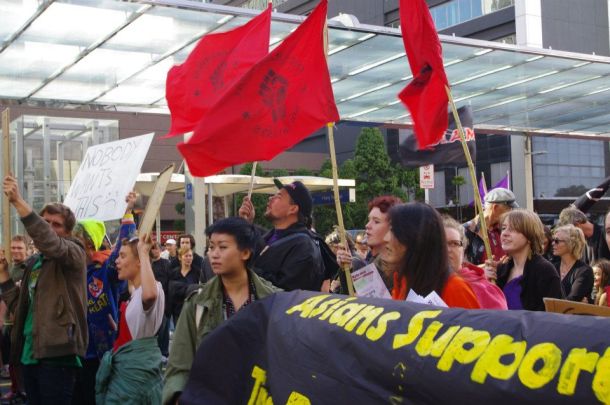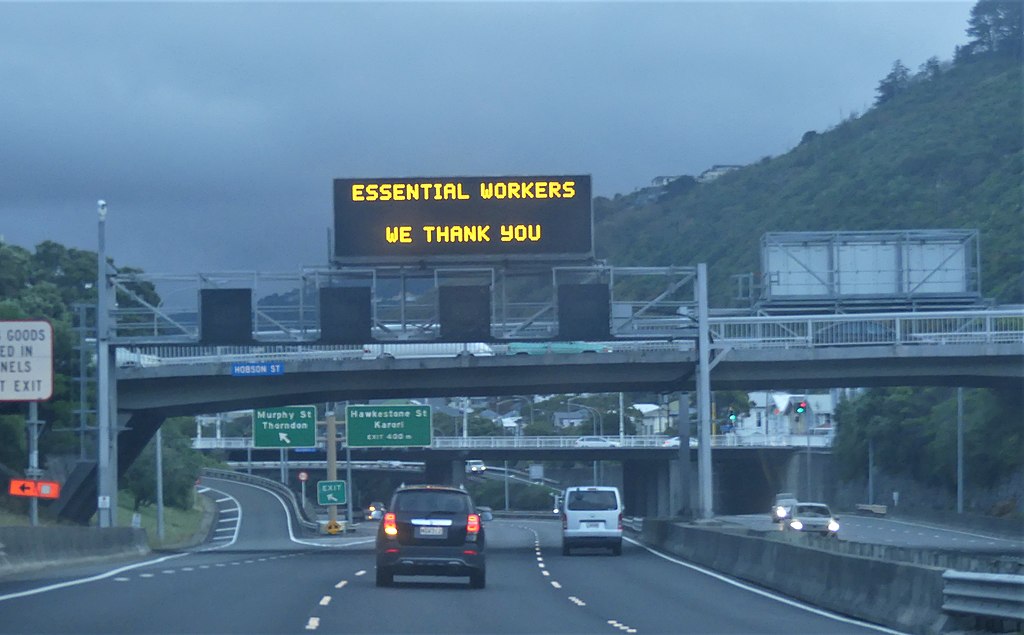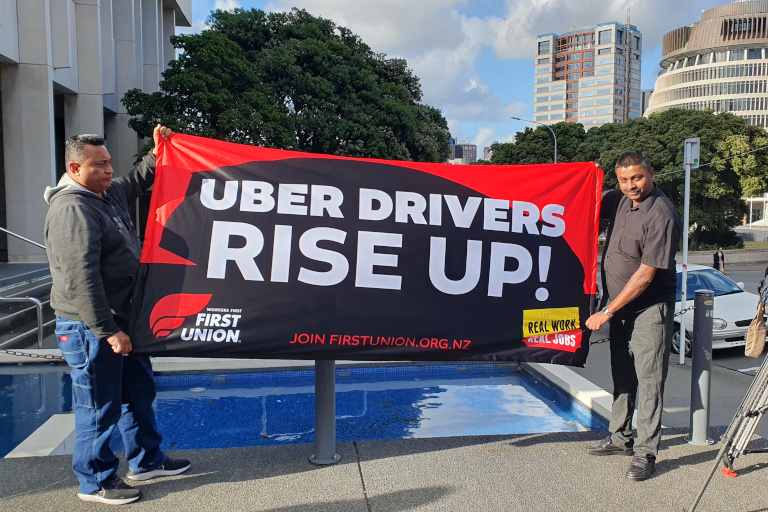Saturday was another reminder that there is deep-seated opposition to the government’s asset sales plans, whatever the spin around the advertisements may be. Asset sales benefit the rich and power is a public good that should run by the public in the public interest. It’s a simple, class-based analysis that resonates.
The spirit of the rallies – the obvious anger, the hatred of this government and its pro-business agenda – was very positive. Crowds across the country were noisy and determined. This was not the first rally; it will not be the last. The numbers were decent – around 800 in Auckland, approximately 500 in Wellington and several hundred in Dunedin, to count the rallies we attended – and consistent.
But the campaign against asset sales is caught up in big contradictions, too, and is hampered by the dominance of nationalist ideas. New Zealand First, the party of Muldoonist reactionaries and anti-Asian racism, endorses these events and marches. Promoters on the Aotearoa is Not for Sale website talk about “these assets” as “the economic sovereignty of our nation.” But there is no “our” nation; some New Zealanders – the wealthy – will do very well from sales, while the vast majority – workers and the poor – will suffer still higher prices and further loss of control. That’s got nothing to do with nationality, and everything to do with class.
A nationalist analysis – and accusations of treason against Key – disorients our side, and can let racist ideas and arguments into the movement. We have argued against this in the past, and continue to fight against these poisonous currents.
There’s an alternative view, and one which was present in the rallies’ make-up. That’s a class analysis, one that looks to the power of workers – whatever our nationality – to take on asset sales. At the Wellington rally there was an excellent speech from a representative of the Rail and Maritime Transport Union drawing links with when the rail was privatized, and pointing out the spike in accidents and deaths following the sale. In Dunedin, Maritime Union members marched with their banners, as did members of the Post Primary Teachers Association, the Public Services Association and the Engineering, Printing and Manufacturing Union. People on the demonstrations were strongly in support of publicly owned services for need and not for profit, and clear that privatisation would only benefit the rich, not working people. The CTU and many unions have endorsed the campaign – this is a concrete alternative to populism and nationalism.
Report from Francis Eckles – Tamaki Makaurau Branch:
Today we had the Asset Sales protest in downtown Auckland. Members of the ISO branch arrived at around 1pm to start organizing and selling magazines before the actual march started at 2pm. We had 7 members carrying three flags and ultimately sold 41 magazines. The people gathered around the mall at the bottom of Queen St before walking up. The organizers led the events with a bullhorn for chants and a van that continuously played revolutionary-themed music. The protesters numbered around 700 or more, and came from the Labour, Green, Mana and New Zealand First parties, as well as ISO and Socialist Aotearoa.
The march went up Queen St and finished at Aotea Square with speeches from the different parties about asset sales and how detrimental they are to the country.
We sold magazines and chatted with other protesters before heading off to have a discussion about the event. There was positive feedback about the number of different groups present, the size of the protest, and the number of magazines sold. We discussed the effectiveness of different chants and methods of selling mags and were pleased overall. We had some good discussions with other protesters and the event went well in general.
Report from Martin Gregory – Poneke branch:
3 News said 300 marched in Auckland and 100 in Wellington. These are lies, deliberate lies in the service of capitalism by the TV company. The true figures are much higher. Six or seven hundred in Auckland, 500 in Wellington, and something between 250 and 400 in Dunedin are estimates by people who were there. The protesters scored an important point, which is that on the eve of the Meridian part-privatisation opposition to asset sales has not gone away. Opposition to sell offs will dog the National-led government through to the next general election. It has to be said though that the marches were small, but behind those who marched stand over 300,000 who signed the petition for a referendum.
The big battalions did not support the action. Where were the unions, the Green Party and Labour? There were a few honourable exceptions from local union branches and Labour Party members who did turn out, but hardly any from the Green Party. Why weren’t the political leaders and union presidents speaking at the rallies, apart from Metiria Turei at Dunedin?
Aotearoa Is Not For Sale issued a press release that said that the protests were backed by the trade union movement and the Labour Party. Let’s not delude ourselves, token support apart, there was no mobilisation. Has the EPMU, which has members in the power companies and the most to lose, even supported the campaign at all? There was no publicity for the protests on unions’ websites, Labour’s or the Green’s. The truth is that the parliamentary cretinism of Labour and the Greens draws them to look for respectability, not mass protests. Now that the referendum petition has been lodged, the Labour and Green Party leaderships seem set to concentrate on their electricity price regulation scheme as their pitch on the issue. They have dropped campaigning.
One union leader who did support the Wellington march was Howard Phillips, vice-president of the Rail and Maritime Transport Union. He spoke very well at the rally outside Parliament with a clear analysis that drew on the experience of the rail sell off and buy back fiasco. His speech drew enthusiastic applause. Other speeches appealed more to left nationalism on the theme that the asset sales are un-patriotic. Left nationalist politics have dominated the campaign all the way through. It’s a weakness because the nationalism obscures the issue about privatisation. The asset sales are not an un-patriotic economic mistake by National, but a grab for profits by New Zealand capitalists at the expense of the rest of us.
Andrew Tait of the Otepoti Branch talked to people at the rally there as part of the report:
In Dunedin, Maritime Union members marched with their banners, as did members of the Post Primary Teachers Association, the Public Services Association and the Engineering, Printing and Manufacturing Union. People on the demonstrations were strongly in support of publicly owned services for need and not for profit, and clear that privatisation would only benefit the rich, not working people.
The speakers from political parties were spaced far apart, unfortunately, so it was hard to get a sense of what appealed to demonstrators. Brian Roper, speaking before the march, won whoops and cheers with his attacks on John Key and his rich white mates who stood to benefit from asset sales, but Metiria Turei, Green co-leader, also charmed the crowd with a down-to-earth style speech. It was a pity that she spoke an hour before Olive McRae, of Mana, and Victor Billot, of the Maritime Union and the Alliance, who laid down some very clear challenges to ‘business as usual’ and the pro-business orientation of the Greens and Labour. Labour MP Clare Curran, as usual, was confused about what she had to say and who she was speaking for, laternating between ‘the demo’, ‘our demo’ and tellingly ‘your demo’ during her speech.
Jen Wilson, a lawyer and member of the International Socialists Organisation, said she was there “to support the kaupapa of the no asset sales and let the government know they can’t walk all over people without them protesting.”
Troy Simonsen, a watersider and member of the Maritime Union, was there “to oppose asset sales because its what’s we’ve foug for in the past and [must fight for] for our children and their future. We don’t want overseas owning us. The union is here for support and it’ll affect us too if the government decides to privatise the ports.”
Kay Murray, Alliance member said “I’m here representing Alliance and Alliance would renationalise [power companies] because it’s the only way to keep power affordable. It’s an essential service. We don’t care if that upsets the share market.”
Ralph said “I’m here because my father worked on the dams and he’d be gutted to see what they are doing. he used to work 18 hour days and be absolutely exhausted. People literally died to build those dams to provide power for us. This [privatisation] is an insult to all these people.”
Sana said: “It’s important to show support for these issues that matter and you can’t complain about what happens if you don’t criticise and if you aren’t willing to change it.”
Lydia said: “It seems like a really stupid idea. They say its for NZ families but how many families have a spare couple of grand. With the TPPA as well, will this mean we lose our sovereignty.”
Emma said: “National doesn’t have a mandate on behalf of New Zealanders alive now let alone future generations. Only a third of New Zealanders voted for them. that’s why I am really supportive of the referendum [on asset sales]”.
Greg said: “I see it as a desperate measure from a broken system. It’s the capitalist elite propping up a broken system.”
Across the country around 30 members of the ISO attended protests and sold about 95 copies of Socialist Review #43. Photo credits: Roshan Masoumi, Kevin Hodder and Eniko Kirkby.
More Photos:



